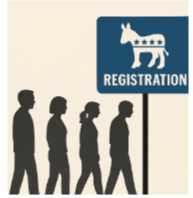A 25-year Kellogg study finds science use in policymaking is up, but each party relies on different research.
What to Know
- From 1995 to 2020, the percentage of policy documents citing scientific studies rose from 20% to over 35%.
- Only 5% of cited science is shared between Democrats and Republicans, despite an expected overlap of 12%.
- Democratic committees are 1.8x more likely to cite science than Republican ones; left-leaning think tanks cite science 5x more often than right-leaning ones.
- 96% of Democratic elites trust scientists to produce unbiased knowledge, compared to 63.7% of Republicans.
- Democrats also cite more peer-reviewed, high-impact studies, while Republicans lean on less-cited or ideologically aligned work.
A groundbreaking 2025 study led by Dashun Wang of Northwestern University’s Center for Science of Science and Innovation (CSSI) delivers a sobering message: even when politicians “follow the science,” they’re often following entirely different maps.
Data from Kellogg Insight
Published in Science and summarized by Kellogg Insight, the research platform of Northwestern’s Kellogg School of Management, the study draws from over 240,000 policy documents and 424,000 scientific references. Its core finding is stark: science is no longer a neutral arbiter in Washington—it’s become another axis of partisanship.
A 25-Year Rise in Scientific Citations
Between 1995 and 2020, the share of U.S. congressional committee reports and think tank publications citing at least one scientific study rose dramatically—from 20% to over 35%. The researchers—Wang, Alexander C. Furnas of CSSI, and Timothy M. LaPira of James Madison University—analyzed 49,345 congressional documents, 191,118 think tank papers, and 424,199 individual scientific references.
Data from Kellogg Insight
These citations covered 23 academic disciplines and 17 public policy domains.
“In some sense, the relationship between the two frontiers of science and politics is closer than ever,” said Wang. “But the kind of science each side is using couldn’t be more different.”
The authors believe this surge may be driven by greater digital access to scientific research and a decline in subject-matter expertise among congressional staff.
“Access to science has expanded… and there’s been a decline in issue-area expertise among Congressional staff,” said Furnas. “So you might expect folks to use more outside sources and references.”
The Illusion of Common Ground: Just 5% Overlap
The study found that only 5% of cited scientific studies were shared between Republican and Democratic policy documents.
“What we can infer is that when partisans are using scientific evidence… they are not drawing broadly across all possibly relevant science,” said Furnas. “They’re drawing on the science that helps them make their point instead.”
Data from Kellogg Insight
Statistically, they expected around 12%—suggesting a deliberate or subconscious preference for information that reinforces ideological priors. Even when controlling for single-use studies, the overlap remained below 6%.
Case Study: Same Topic, Different Universe
The research illustrates this partisan divide with a telling example: the Urban Institute (left-leaning) and the Employment Policies Institute (right-leaning) each released reports on raising the minimum wage.
Despite writing on the exact same topic and titling their papers similarly, out of 62 cited studies, they shared just one. This division is structural rather than just thematic. Using deep learning models, the researchers visually mapped the studies into clusters by topic. The result was a stark divide: Democrats heavily cited work in public health, environmental studies, and education, while Republicans leaned on economics, criminal justice, and business research.
Democrats Cite More to Trust Issues
The study found that Democratic-controlled congressional committees are 1.8 times more likely to cite science than Republican ones. When a committee flipped from Republican to Democrat control, the number of scientific citations increased by an average of 196. In the think tank world, the contrast was even sharper: left-leaning institutions were five times more likely to cite scientific studies than their conservative counterparts.
In addition to citing more, Democrats did so more effectively. Democratic policymakers were significantly more likely to reference peer-reviewed and top 5% most-cited studies in their fields.
“Democrats cite higher-impact science, or papers that scientists themselves consider more important,” said Furnas.
The team also surveyed 3,500 U.S. political elites, including staffers, bureaucrats, C-suite executives, journalists, and government officials. The trust gap they discovered was dramatic: 96% of Democrats said they trust scientists to produce unbiased knowledge, compared to 63.7% of Republicans.
Data from Kellogg Insight
As Wang observed, “Trust has always been an important factor in the use of information.”
Trust in major scientific institutions also varied: 61.2% of Democrats rated the National Academies of Sciences as “very trustworthy,” while only 22.8% of Republicans said the same. For the American Association for the Advancement of Science, the numbers were 40.7% vs. 8.2%, respectively.
Policy Without Consensus
The promise of science in policymaking is that it offers a shared foundation of facts—an objective basis for debate. But when political actors begin citing different research, using different metrics, and trusting different institutions, that shared basis erodes.
“When partisans are using different sets of science and have different understandings of the state of the world,” Furnas noted, “that can potentially cause problems for effective democratic governance.”
This issue impacts markets, journalists, and voters alike, making it more than just an academic one. When Democrats craft healthcare policy using peer-reviewed public health research, while Republicans rely on think tank-produced economic modeling, public debate turns from negotiation to confusion. Even bipartisan issues like artificial intelligence or infrastructure become difficult to navigate when the factual premises don’t match.
Wrap Up
This study, published in Science and reported by Kellogg Insight, is among the clearest empirical indictments of the growing epistemological divide in American politics. Science isn’t being rejected—but it is being siloed. Democrats are citing more science, more often, and from higher-impact sources. Republicans are citing less, and from different domains. Both sides are acting in good faith—but they’re doing so in separate factual universes.
Still, there is a thin silver lining. That 5% overlap—though small—represents a potential bridge.
As Wang put it, “We want to drill down on this core overlap and understand it better. Potentially, that could be a way to promote more trust in science and policy.”
In a country where even objective facts have become politically charged; rediscovering that sliver of shared science may be the only way forward.
See full article at Kellogg Insight

.png)



.jpg)